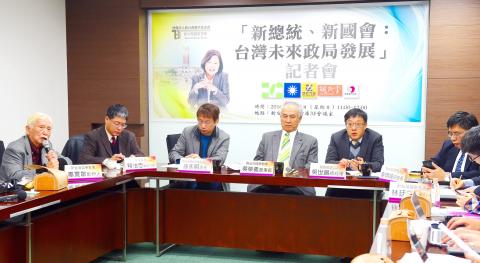The Taiwan Brain Trust (TBT) think tank yesterday urged the Chinese Nationalist Party (KMT) to be “localized,” and China to be practical in handling cross-strait relations.
The KMT’s heavy defeat showed voters do not trust the party’s China-leaning policies, therefore the KMT should adjust its stance and become more “localized,” Soochow University political science professor Hsu Yung-ming (徐永明) told a news conference at the think tank’s headquarters in Taipei.
“When the Chou Tzu-yu (周子瑜) incident happened, President Ma Ying-jeou (馬英九) immediately expressed his support [for Chou], but it still became a political tsunami, and while all three presidential candidates had similar reactions, the KMT was still hurt the most by it,” said Hsu, who is also a New Power Party legislator-at-large-elect.

Photo: Chien Jung-fong, Taipei Times
Chou, a 16-year-old Taiwanese singer in South Korea, was labelled by China-based Taiwanese singer Huang An (黃安) as a supporter of Taiwan independence after she held a Republic of China (ROC) flag on a TV show in South Korea. A video clip released late on Friday that showed Chou apologizing drew angry responses in Taiwan. Many reacted by casting their votes for Democratic Progressive Party (DPP) Chairperson Tsai Ing-wen (蔡英文) on Saturday to show their discontent over China’s sovereignty claim over Taiwan.
Meanwhile, think tank deputy executive director Lin Ting-hui (林廷輝) called on Beijing to take a more practical approach in its handling of cross-strait relations.
“Taiwanese want a transparent, open and healthy cross-strait relationship,” Lin said. “Ma might have done much, but the problems are transparency and justice.”
Lin said that in the past 10 years, the KMT has had an almost monopoly over cross-strait exchanges, adding that such exchanges have not been effective, but have contributed to a rising Taiwan identity and a sense of crisis among the public.
“Beijing has always said that it ‘puts hopes in the people of Taiwan,’ and it is time for it to rethink what that means,” Lin said. “Tsai has held out the olive branch in her acceptance speech that she would strive to maintain the ‘status quo’ while trying to communicate with Beijing, and now it is Beijing’s turn to think how it would respond to the call.”

ENDEAVOR MANTA: The ship is programmed to automatically return to its designated home port and would self-destruct if seized by another party The Endeavor Manta, Taiwan’s first military-specification uncrewed surface vehicle (USV) tailor-made to operate in the Taiwan Strait in a bid to bolster the nation’s asymmetric combat capabilities made its first appearance at Kaohsiung’s Singda Harbor yesterday. Taking inspiration from Ukraine’s navy, which is using USVs to force Russia’s Black Sea fleet to take shelter within its own ports, CSBC Taiwan (台灣國際造船) established a research and development unit on USVs last year, CSBC chairman Huang Cheng-hung (黃正弘) said. With the exception of the satellite guidance system and the outboard motors — which were purchased from foreign companies that were not affiliated with Chinese-funded

PERMIT REVOKED: The influencer at a news conference said the National Immigration Agency was infringing on human rights and persecuting Chinese spouses Chinese influencer “Yaya in Taiwan” (亞亞在台灣) yesterday evening voluntarily left Taiwan, despite saying yesterday morning that she had “no intention” of leaving after her residence permit was revoked over her comments on Taiwan being “unified” with China by military force. The Ministry of the Interior yesterday had said that it could forcibly deport the influencer at midnight, but was considering taking a more flexible approach and beginning procedures this morning. The influencer, whose given name is Liu Zhenya (劉振亞), departed on a 8:45pm flight from Taipei International Airport (Songshan airport) to Fuzhou, China. Liu held a news conference at the airport at 7pm,

Taiwan was ranked the fourth-safest country in the world with a score of 82.9, trailing only Andorra, the United Arab Emirates and Qatar in Numbeo’s Safety Index by Country report. Taiwan’s score improved by 0.1 points compared with last year’s mid-year report, which had Taiwan fourth with a score of 82.8. However, both scores were lower than in last year’s first review, when Taiwan scored 83.3, and are a long way from when Taiwan was named the second-safest country in the world in 2021, scoring 84.8. Taiwan ranked higher than Singapore in ninth with a score of 77.4 and Japan in 10th with

GRIDLOCK: The National Fire Agency’s Special Search and Rescue team is on standby to travel to the countries to help out with the rescue effort A powerful earthquake rocked Myanmar and neighboring Thailand yesterday, killing at least three people in Bangkok and burying dozens when a high-rise building under construction collapsed. Footage shared on social media from Myanmar’s second-largest city showed widespread destruction, raising fears that many were trapped under the rubble or killed. The magnitude 7.7 earthquake, with an epicenter near Mandalay in Myanmar, struck at midday and was followed by a strong magnitude 6.4 aftershock. The extent of death, injury and destruction — especially in Myanmar, which is embroiled in a civil war and where information is tightly controlled at the best of times —